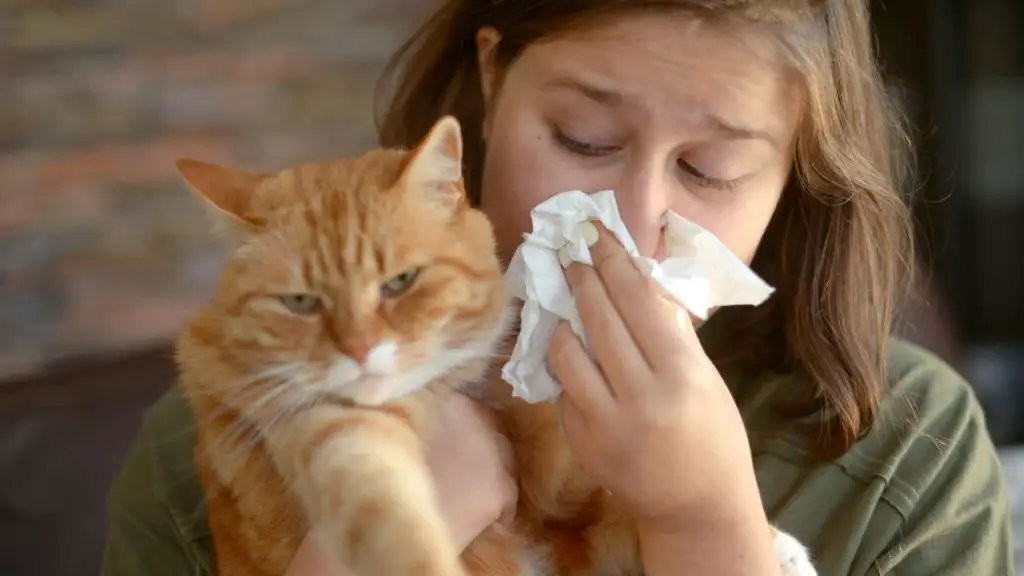Trying to get rid of cat allergies? There are several natural ways, limiting contact with cats, utilizing air purifiers, frequently washing bedding, incorporating supplements such as probiotics and quercetin, and trying essential oils like eucalyptus or lavender. It is crucial to seek professional advice before experimenting with any remedies, particularly if you experience severe allergies.
Cat allergies blocking your way to having a furry pal? Don’t fret! You can take action to naturally reduce your symptoms. This article will teach you how to lower allergens and battle against sneezing and other allergic responses. Just a few everyday adjustments are all it takes.
Cats can bring joy and companionship. But, if you’re allergic, they can cause discomfort and even health problems. Cat allergies are caused by proteins in cats’ skin cells, saliva, and urine. Symptoms include sneezing, congestion, itchy eyes/nose/throat, watery eyes, coughing, wheezing, rash, and increased asthma.
Medical treatments can help mild to severe reactions. Natural ways may also reduce exposure to allergens and symptoms.
Understanding Cat Allergies
Cat allergies are caused by exposure to proteins in cat saliva, dander, urine, or fur. These proteins, called allergens, can enter the body when touched or inhaled. For sensitive individuals, even small amounts of allergens can create an immune response that leads to sneezing and coughing.
Many people think buying a hypoallergenic breed of cat will help. However, there is no such thing as a truly hypoallergenic breed. All cats have some level of allergens. Even if you get a breed with fewer allergens, you need to take precautions and use avoidance techniques.
People also think regular bathing or brushing will get rid of cat allergies. This is not true. Severe allergy sufferers must avoid contact with cats. But, if you are able to groom and bathe your cat, it may lower allergen levels in the air. Regular cleaning of your home (vacuuming carpets and dusting surfaces) will help keep allergy symptoms under control, while still letting you enjoy your pet.
Common Symptoms of Cat Allergies
Cat allergies are a common issue. Symptoms may be different for each person. They could involve sneezing, itching, stuffiness, watery eyes, itchy scalp, or skin problems. They may be seasonal or year-round. In serious cases, anaphylaxis can happen if you are not careful.
You must identify the source of your allergy and limit exposure. Here are tips to help:
- Bathe your cat with hypoallergenic shampoo.
- Keep windows closed when cats are around.
- Use air purifiers with HEPA filters.
- Avoid carpeting and soft furnishings.
- Wear a face mask if you need to be around cats.
Causes of Cat Allergies
Cat allergies are caused by proteins in their dander, urine, saliva, and fur. These proteins become airborne and can make us sneeze and cough. Allergy severity will decide the best treatment. To get rid of allergies, you must remove the cat. But, there are natural remedies that reduce symptoms.
- Quercetin, an antioxidant, blocks pathways linked to allergic reactions.
- Probiotics lessen inflamed allergens.
- Honey has trace amounts of allergens which may help.
- Nettle leaf or chamomile tea has anti-inflammatory properties.
- Lastly, use air purifiers with HEPA filters. This can reduce dander particles inside your home.
Natural Remedies for Cat Allergies
Cat allergies are common, yet uncomfortable and disruptive. They are caused by proteins in cat saliva, urine, and skin cells – pet dander. The dander can become airborne, and cause an allergic reaction when touched or breathed in.
Here are some natural remedies you can try for relief:
- Quercetin: an antioxidant found in apples and onions with antihistamine properties.
- Butterbur: an herb traditionally used for chest congestion pain relief, which may decrease nasal swelling due to allergies.
- Probiotics: introduce healthy bacteria into the gut, which could reduce allergic responses from airborne irritants like cat dander.
- Reishi Mushroom Extract: derived from mushroom cells, known to boost the immune system and have antihistamine properties.
- Apple Cider Vinegar: reduces inflammation caused by allergies and mucus formation.
These natural remedies might help with cat allergy symptoms, but it is important to discuss them with a health professional first.
Diet and Lifestyle Changes for Cat Allergies
Diet and lifestyle changes can help lessen cat allergies. Eating foods rich in vitamin C, like citrus fruits and leafy greens, may reduce sneezing and itchy eyes. Omega-3 fatty acid supplements could also help reduce inflammation.
Stress can worsen allergies by releasing histamine, so take time to relax. Activities like deep breathing, yoga, and mindfulness can help.
To stay healthy, get some exercise and enough sleep. This boosts the immune system and helps the body handle allergens better.
Regularly Launder Your Clothes and Fabrics
Getting rid of cat allergens can be hard. But regular maintenance helps. Start by cleaning pet bedding and fabric surfaces near your cat. This includes toys, scratching posts, carpets, curtains, and furniture with cloth covers.
Use a vacuum cleaner with a HEPA filter to capture the dander and particles on carpets and upholstery. Wash clothes and linens in hot water every few days. Don’t leave clothes from the day outside in laundry baskets or closets. Allergen particles could come into contact with other items, or enter the air in your home.
Conclusion
So, we can naturally reduce cat allergies with lifestyle changes, supplements, and essential oils. Keep the environment clean and hygienic. Get air purifiers and vacuums with HEPA filters to clear allergens. Use natural remedies first, before taking medication. Knowing the causes and treatments of cat allergies can also cut down symptoms.







